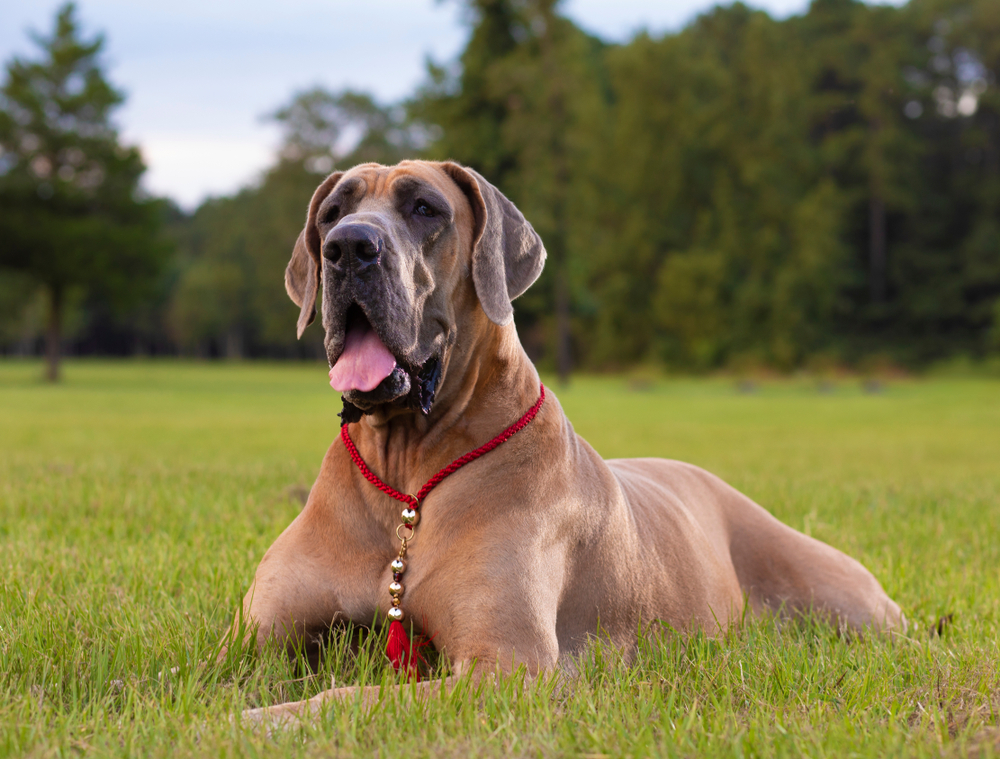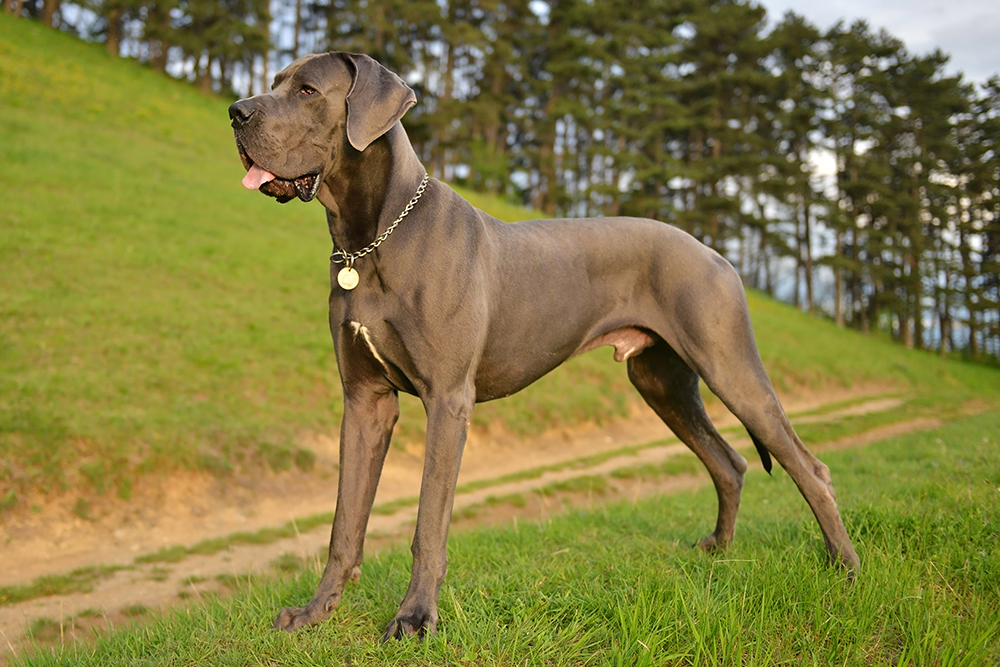
The Great Dane is generally recognized as being the tallest dog breed in the world. Despite its imposing size and the strength that comes with it, the breed is also known as a gentle giant. They are often affectionate and loving, although they don’t always seem to know just how big they are!
For a dog of such enormous size, we would expect the Great Dane’s bite to pack one hell of a punch, but you might be surprised to learn that bite force isn’t just about the size of the dog. Based on their head size and jaw muscles, we estimate that the bite force of a Great Dane is likely to be around 240 pounds per square inch PSI), but this is only an approximation.
Although there are many websites that list quite specific values for the bite force of many different breeds, we have discovered that there is actually very little scientific research and evidence on the subject. Therefore, we take some of the figures we do know, pair them with some key physiological values, to give us an estimated measure of bite force.


Great Dane Bite Force
The Great Dane originated in Germany, and it is believed that it was bred from the Irish Wolfhound and the English Mastiff, both of which are giant breeds themselves. They were first bred to hunt wild boar, which would have required the dogs to be athletic and strong, as well as for them to have a formidable bite force.
Over time, they have become better known as companion pets and as watchdogs, rather than hunters, but they have retained the physical features that made them effective hunters.
They do have large jaws and big teeth, which means they can do considerable damage if they do bite. However, they lack the sizable musculature of some other breeds, like the Pit Bull, Cane Corso, or Kangal.
Compared to Other Animals
The Great Dane’s bite force is higher than a human’s bite force, which can range from 160 to 200 PSI, and it is roughly equivalent to some other dog breeds including the German Shepherd, and slightly higher than the average dog bite force.
However, it is less than breeds like the Rottweiler, English Mastiff, and the Kangal, and is certainly lower than wild predators like lions and tigers.
National Geographic’s Dr. Brady Barr has studied animal bites, testing humans, domestic dogs, and wild animals alike. Based on the research by Dr. Barr, the Pit Bull has a bite force of around 242 pounds per square inch (PSI). By comparison, a wolf has a bite force of roughly 400 PSI and a shark around 600 PSI.


How Is Bite Force Measured?
There are a number of different ways that bite force can be measured, but none of them will be able to accurately predict just how hard a dog may bite in a stressful or aggressive situation.
One method involves using probes attached to anesthetized patients to manipulate the jaws to give an approximation of the bite force. Another uses the anatomy of the bones, muscles, and ligaments of the skull to predict bite force values.
A third method uses pressure sensors placed in a glove or armband used to train police dogs. This sort of study has given us some real world measurements of the bite force of some German Shepherd and Belgian Malinois, but even these have only been obtained during training sessions, and do not account for the impact of adrenaline in a real world situation.
Are Great Danes Aggressive?
Great Danes are generally referred to as gentle giants. They tend to be quite timid, and they seem to have an inherent understanding that their size means they can accidentally injure people. They are considered good with children, but that massive frame means there is always a risk of accidental injury.
However, without proper training and socialization, there is always the risk of any dog becoming aggressive. Great Dane owners need to ensure that their big dogs learn proper, respectful behavior when they are young. This means discouraging them from jumping up and also ensuring they know how to behave properly around strangers.


Do Great Danes Make Good Guard Dogs?
Great Danes are not known for being aggressive, but they can be territorial and very protective. Combined with their formidable size and intimidating bark, they can make good guard dogs. In most cases, if an intruder sees a Great Dane, they are likely to turn away.
Their friendly disposition may mean that they won’t necessarily be the best dogs for defending a property, but they can be a very effective deterrent for any would-be intruders.
Do Great Danes Make Good Pets?
There are some obvious challenges to keeping a dog that can grow to nearly 50 inches tall. They take up a lot of space and will not usually do well in apartments. Being an already massive creature, their propensity for spreading out means they tend to take up a LOT of space, and they also enjoy taking up a lot of their owner’s space too. If you don’t think you could cope with a 160-pound dog laying on top of you, the Great Dane might not be for you.
However, they can be trained, tend to be gentle with their family, and are incredibly loyal and protective. Potential owners need to know the challenges of owning a dog of this stature before owning one because it is a massive undertaking.


Conclusion
Great Danes are known as the gentle giants of the dog world. They are loving and loyal, very affectionate, and they can be protective of their families. Although they are not known for being aggressive, owners need to ensure they have appropriate training and socialization from a young age to ensure they are safe.
They have a bite force that is above average for dogs, although there are numerous breeds with more powerful jaws, and they don’t come close to the bite pressure of wild animals like tigers and lions.
Featured Image Credit: Tara Lynn and Co, Shutterstock



